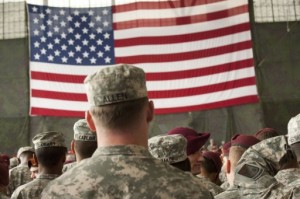American troops lowered the flag of command that flew over Baghdad Thursday morning, carefully rolled it, and placed it in a green and gray case, officially ending the controversial United States military mission in Iraq after nearly nine years.
The understated ceremony under the bright Iraqi sun was the very opposite of the nighttime shock and awe bombardment of Baghdad that began the war against Saddam Hussein in March 2003.
Justified by then-President George W. Bush on the grounds that Hussein was seeking weapons of mass destruction which he could share with terrorists such as al Qaeda, the invasion was deeply divisive in America and around the world.
Hussein’s regime proved easy to topple, but no weapons of mass destruction were found, and the United States and its allies were left occupying a country where there were not greeted as liberators — despite the prediction of Bush’s vice president, Dick Cheney.
Iraq erupted into sectarian violence, leaving American troops to try to contain what threatened to become a civil war.
There’s no definitive tally of the number of Iraqis who have been killed since March 2003, but the independent public database Iraq Body Count has compiled reports of more than 150,000 between the invasion and October 2010, with four out of five dead being civilians.
Defense Secretary Leon Panetta flew into Baghdad Thursday morning for the flag-lowering ceremony, recalling that when he visited in 2006 as a member of Bush’s Iraq Study Group, “sectarian violence was skyrocketing and it seemed as if nothing was working.”
Pero, dijo, “after a lot of blood spilled by Iraqis and Americans, the mission of an Iraq that could govern and secure itself has become real.”
Panetta paid tribute to the nearly 4,500 Americans who were killed and more than 30,000 who were wounded in Iraq.
“Nor will we ever forget the sacrifices of the more than one million men and women of the United States armed forces who served in Iraq, and the sacrifices of their families,” dijo.
Panetta said the United States was “deeply indebted” to all Americans in uniform, and hailed the advances made in Iraq since Hussein was ousted.
And he said the day “is not about the United States. Más bien, today is about Iraq. This is a time for Iraq to look forward.”
Iraqi journalist Mina al-Oraibi warned Thursday that the country could hardly do so with complete confidence.
“The political divisions are huge and no one knows what will happen after December 31,” the date by which American troops must leave, said al-Oraibi, the assistant editor-in-chief of Asharq Alawsat in London.
Iraqis are worried that the United States wants to disengage from their country entirely, dijo, pointing out that President Barack Obama came to office partly on the strength of his opposition to the war, and sent Vice President Joe Biden to visit recently rather than coming himself.
A small number of U.S. troops will remain in Iraq, as will military contractors, dijo.
But Brett McGurk, a former adviser to three U.S. ambassadors, pointed out that Iraq had been in charge of its own security since 2009.
“It’s not like we were controlling Iraq’s security situation last week and now we’re suddenly leaving,” dijo. “We haven’t had troops in Baghdad for over two years.”
Gen. Martin Dempsey, chairman of the Joint Chiefs of Staff, explained in very practical terms what the end of the U.S. mission meant.
Departing from his prepared text, he said he had been able to fly into Iraq on this occasion simply because he wanted to.
“The next time I come here, I’m going to have to be invited by the Iraqi government, and I kind of like that,” Dempsey said, before concluding his speech with thanks and a blessing in Arabic.
Iraqi Prime Minister Nuri al-Maliki was not present, having returned to the country from the United States as the ceremony began. President Jalal Talabani was expected to be there but did not attend.
The ceremony marked the official end of the mission that began with the United States-led invasion of Iraq in March 2003, aimed at toppling Hussein.
His regime fell in a matter of weeks, and he was captured in December 2003 after months in hiding, then executed in 2006 after a trial by Iraq’s new authorities.
All U.S. troops must be out of Iraq by the end of this month after Washington and Baghdad failed to agree on terms under which they could remain.
There were about 5,500 American troops in Iraq as of Tuesday, the most recent day American officials in Iraq gave CNN figures.
A senior defense official traveling with Panetta said that some troops — quizás 3,000 a 4,000 — will remain in Kuwait for a certain period of time, but said the details have not been worked out with the Kuwaitis.
Obama welcomed home returning troops from Iraq Wednesday, hailing their service to help a people they didn’t know as an example of what makes America great.
“As your commander in chief, and on behalf of a grateful nation, I’m proud to finally say these two words, and I know your families agree — welcome home. Welcome home,” Obama told cheering troops at Fort Bragg, Carolina del Norte.
Obama used his Ft. Bragg speech to mark the fulfillment of a campaign pledge he made in 2008 to end the war.
The president spoke of the heavy sacrifice and hard work offered by U.S. los miembros del servicio de la misión en Irak.
“Por tu culpa — porque se sacrificó tanto para un pueblo que nunca había conocido, Los iraquíes tienen la oportunidad de forjar su propio destino,” Obama dijo. “Eso es parte de lo que nos hace especiales como estadounidenses. A diferencia de los imperios de la antigüedad, que por lo que no hicimos por territorio o por los recursos. Lo hacemos porque es lo correcto.
“No puede haber una expresión más plena de apoyo de Estados Unidos para la libre determinación de nuestra dejando Irak a su pueblo. Eso dice algo acerca de lo que somos.”
Fuente: CNN



Sin comentarios
Comentarios para Extremos de la bandera para bajar el polémico U.S. Misión en Irak están cerradas.